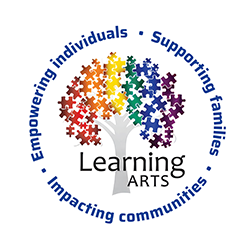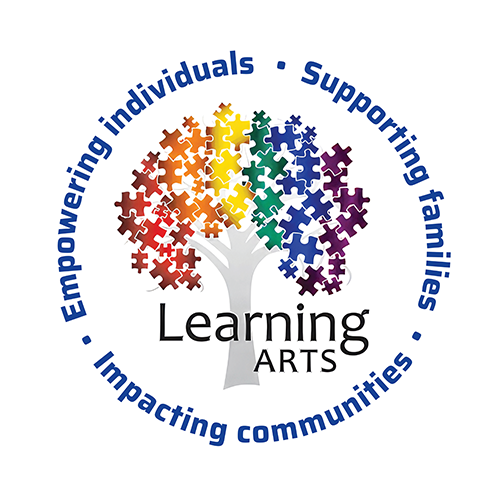
Parenting a Child with Autism

June 5, 2024
Building Bridges of Understanding: A Parent’s Perspective on Autism
Autism Spectrum Disorder (ASD) impacts not only the individual diagnosed with ASD but also their families and communities. Parenting a child with autism can seem daunting, but understanding autism from a parent’s perspective can provide valuable insights and foster a supportive community for those navigating this path. At Learning ARTS, we are here to support families every step of the way with ABA interventions, parent training, social skills training, and educational resources as they navigate their journey with autism.
Understanding Autism: A Parent’s Journey
For many parents, the journey begins with noticing early signs of autism in their child. These signs can vary widely but often include challenges with social interactions, communication, and repetitive behaviors. Parents might observe their child not making eye contact, not responding to their name, or engaging in repetitive movements like hand-flapping. Recognizing these signs early on and taking action to get a diagnosis is crucial, as identifying autism early on can open the door to timely interventions and therapies that can significantly improve a child’s development and quality of life. At Learning ARTS, we provide resources and guidance to help parents identify these signs and take the necessary steps toward diagnosis and intervention.
The Emotional Landscape
 Parenting a child with autism is a unique experience, filled with both challenges and profound rewards. Parents often describe a mix of emotions—from the uncertainty and worry of initial signs and diagnosis to the determination and hope that come with seeking the best care and support for their child to participating in their child’s progress as they continue ABA techniques in the home. It’s a journey that requires resilience, patience, and a deep well of love, but it also yields immense joy and pride. At Learning ARTS, we understand the emotional toll this can take on families and offer resources to help parents navigate their feelings and build a strong support system.
Parenting a child with autism is a unique experience, filled with both challenges and profound rewards. Parents often describe a mix of emotions—from the uncertainty and worry of initial signs and diagnosis to the determination and hope that come with seeking the best care and support for their child to participating in their child’s progress as they continue ABA techniques in the home. It’s a journey that requires resilience, patience, and a deep well of love, but it also yields immense joy and pride. At Learning ARTS, we understand the emotional toll this can take on families and offer resources to help parents navigate their feelings and build a strong support system.
Navigating Autism Therapy and Interventions
Once a diagnosis is made, parents are faced with the task of navigating various autism therapies and interventions. This can include Applied Behavior Analysis (ABA) therapy, speech therapy, occupational therapy, and social skills training, among others. Each child is unique, so finding the right combination of therapies that cater to their specific needs is crucial.
At Learning ARTS, we work closely with families to create personalized treatment plans that address each child’s unique strengths and challenges. Our Board Certified Behavior Analysts (BCBAs) facilitate this process through Coordination of Care meetings where they can help educate anyone involved in your child’s care, including their school, an occupational or speech therapist, health or other mental health professionals, and even extended family members. By ensuring everyone involved in the child’s care is on the same page, we help to create a cohesive and supportive environment that maximizes the effectiveness of each intervention. Our experienced professionals are here to guide parents through the process, ensuring they have the information and support needed to make informed decisions. We also have resources available to help parents face the reality of all the logistics involved – such as how to pay for autism services.
Building a Supportive Environment
Creating a supportive environment at home and within the community is essential. For parents of children within the autism spectrum, this can mean adjusting daily routines, creating structured and predictable environments, and employing specific communication strategies to help their child thrive. Additionally, connecting with other families facing similar challenges can provide invaluable support and a sense of community. Learning ARTS offers training sessions for parents, equipping them with practical tools and strategies to create nurturing and supportive environments for their children.
 Celebrating Milestones and Progress
Celebrating Milestones and Progress
Every child with autism has their own set of strengths and abilities. Celebrating small milestones and progress is an important aspect of ABA therapy, no matter how minor they may seem. These achievements are a testament to the hard work and dedication of both the child and their parents. Whether it’s a new word spoken, a social interaction successfully navigated, or a personal goal achieved, each victory is significant. Additionally, the reward reinforces the desired behavior. At Learning ARTS, we celebrate these milestones with our families, providing encouragement and recognition for each step forward.
Advocating for Awareness and Acceptance
Parents of children with autism often become advocates not just for their own child but for the broader autism community. Raising awareness about Autism Spectrum Disorder and promoting acceptance and understanding within society can help reduce stigma and create a more inclusive environment for all individuals with autism. Sharing personal stories, participating in autism awareness events, and educating others are powerful ways to build bridges of understanding. Learning ARTS actively works alongside families to promote a greater understanding and acceptance of autism. We invite you to visit our Facebook page to experience a community of understanding and acceptance.
Conclusion
Parenting a child with autism is a journey filled with unique challenges and remarkable rewards. By understanding autism and the experiences of parents, we can foster a more compassionate and supportive community. Through early diagnosis, appropriate interventions, and a commitment to awareness and acceptance, we can help children with autism reach their full potential and celebrate their individuality.
At Learning ARTS, we are dedicated to providing comprehensive support and resources for families navigating autism. Together, we can build a brighter future for our children, one that is filled with understanding, acceptance, and endless possibilities.
For more information, please contact us at referrals@learningarts.com, and for further reading and resources, please visit:

About Author: Learning Arts
Formed by Dr. Will Brandon in 1997, Learning ARTS has been on a mission to be a leading force in autism therapy, pushing the boundaries of what’s possible and creating a brighter future for individuals within the autism spectrum, their families, and communities for nearly 30 years.
It is that experience that helps us understand that finding the right treatment for an individual within the autism spectrum can be overwhelming and confusing. But rest assured, when you choose Learning ARTS, you’re choosing a partner for your family’s autism journey. We offer a personalized, family-oriented approach to care that focuses on building relationships and social skills while providing access to community and classroom functions. Together, with our team by your side, your family will thrive.



